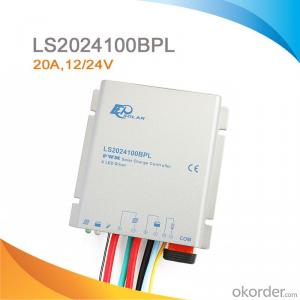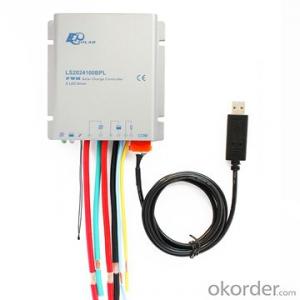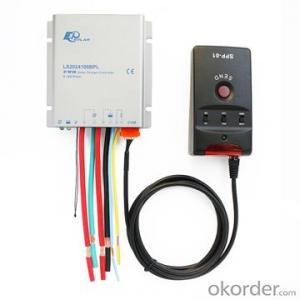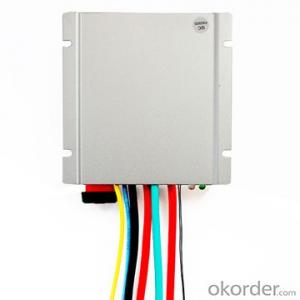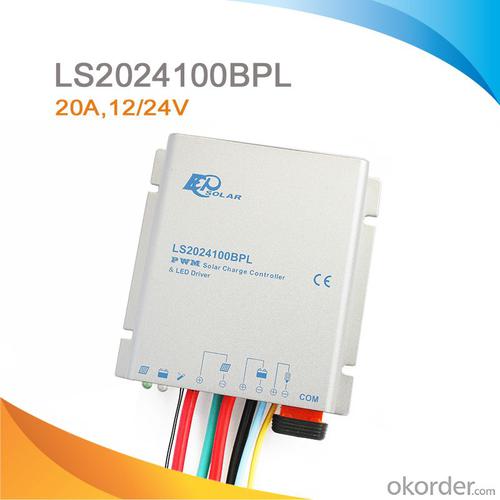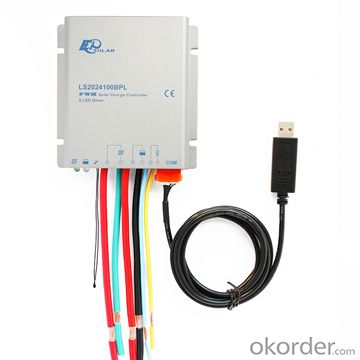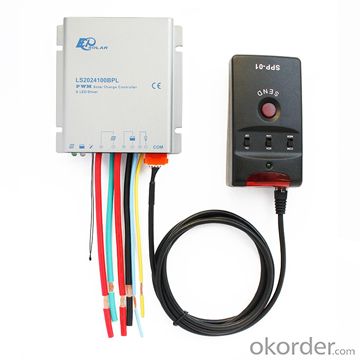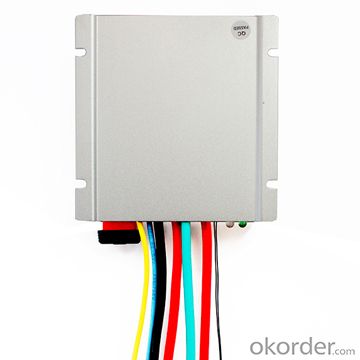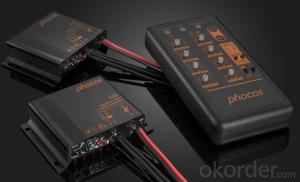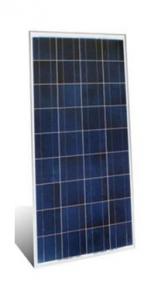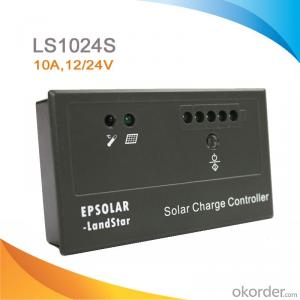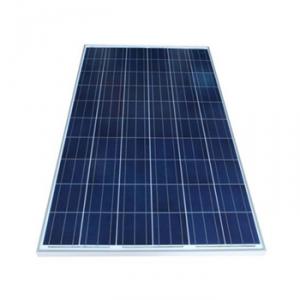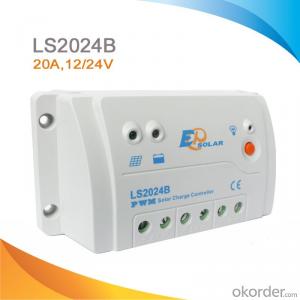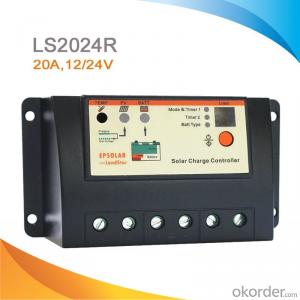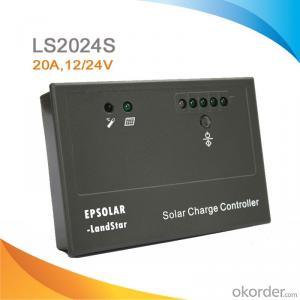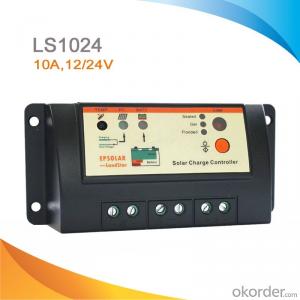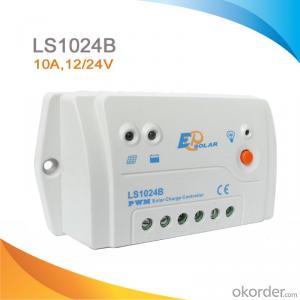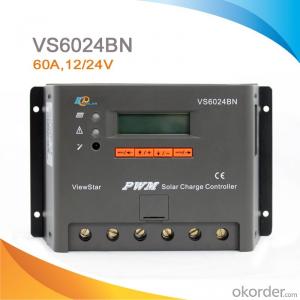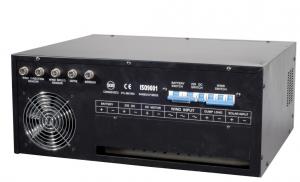PWM Solar Charge Controller and LED Constant Current Driver 20A,12/24V, LS2024100BPL
- Loading Port:
- China main port
- Payment Terms:
- TT or LC
- Min Order Qty:
- -
- Supply Capability:
- -
OKorder Service Pledge
OKorder Financial Service
You Might Also Like
Features:
·12V/24V automatic identify or user-defined working voltage.
·Gel, Sealed, Flooded and user-defined battery type option.
·With functions of current power calculation, it is convenient to view charging and discharging energy of each day, month, year and total value.
·Wide input voltage range:DC8.0V—DC32V, compatible with 12V/24V full voltage range.
·Digital precision constant current control and the control accuracy are better than ± 2%.
·Maximum output efficiency of 95%.
·The rated output current can be adjusted at rated power and current range.
·The max output voltage can reach up to 60V
·Charge control parameter, the load control parameter and the output current value can
be set separately.
·Use of standard Modbus communication protocol for TTL232 bus connections,
communication protocol compatibility much better.
·Fully encapsulated PCB, IP67 protection.
·Aluminum housing.
Load control mode:
Manual, Light ON/OFF, Light ON+ Timer, Time Control
Electronic Protections:
·PV array short circuit
·PV reverse polarity
·High voltage transients
·Over discharge
·Overcharge
·Load overload
·Load short circuit
·Battery reverse polarity
·Overheating
Specification:
Electrical parameters | LS102460BPL | LS152480BPL | LS2024100BPL |
Nominal system voltage | 12 / 24VDC | ||
Battery terminal voltage | 8~32V | ||
Maximum PV input voltage | 50V | ||
Rated charge current | 10A | 15A | 20A |
Rated output power | 30W/12V, 60W/24V | 40W/12V, 80W/24V | 50W/12V, 100W/24V |
Rated output current | 2.0A | 2.6A | 3.3A |
Max. efficiency | 95% | ||
Output voltage range | Voltage of battery~60.0V | ||
Load open circle voltage | 60.0V | ||
Power output adjustment time | <10s | ||
Self-consumption | ≤9.1mA(12V); ≤7.0mA(24V) | ||
Control accuracy | < 2% | ||
Temp. compensation coefficient | -3mV/℃/2V(25℃) | ||
Enclosure | IP67 | ||
Dimension | 108.5x73x25.6 mm | 108.5x96x25.6mm | 108.5x110x25.6mm |
Power cable | 4mm2(PV/Batt.) 1.0mm2(Load) | 6mm2(PV/Batt.) 1.5mm2(Load) | 6mm2(PV/Batt.) 1.5mm2(Load) |
Net weight | 0.4kg | 0.5kg | 0.6kg |
Working temperature | -35℃ to +55℃ | ||
Humidity | ≤90%(NC) | ||
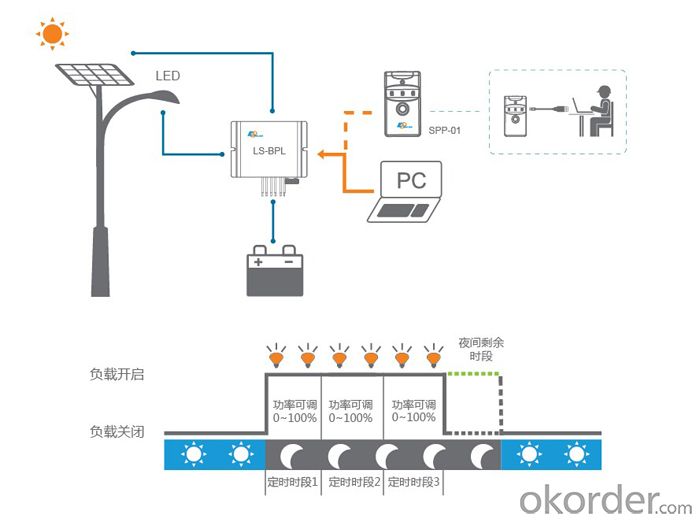
FAQ
Q1. What is the difference between MPPT&PWM?
A1. MPPT has higher efficiency, it can track the max power point and won't waste energy.
Q2. What is the efficiency of the MPPT controller?
A2. MPPT>99%, peak conversion efficiency>98%.
Q3. What is the waranty of product?
A3. 12 months.
Q4. What protection does your MPPT controller have?
A4. PV array short circuit, PV reverse polarity, Battery reverse polarity, Over charging, Output short circuit.
- Q: Can a solar controller be used with solar-powered waste management systems?
- Solar-powered waste management systems can indeed utilize a solar controller. This controller, a vital component of any solar power system, is responsible for regulating the voltage and current levels of the solar panels. Its main purpose is to ensure optimal charging of the batteries and protection against any potential damage. In the context of solar-powered waste management systems, the solar controller would play a vital role in managing the charging process of the batteries that power the entire system. Its functions would include monitoring the output of the solar panels, controlling the flow of electricity to the batteries, preventing overcharging or deep discharging, and maximizing the efficiency and lifespan of the batteries. By effectively utilizing solar energy, this guarantees that the waste management system operates reliably and efficiently.
- Q: Can a solar controller be used with different types of solar panel cleaning systems?
- Different types of solar panel cleaning systems can be used with a solar controller. The solar controller is responsible for regulating and optimizing the charging and discharging of batteries in a solar power system. Its purpose is to ensure efficient and safe charging of batteries by controlling the flow of electricity from the solar panels. The functioning of the solar controller is not directly affected by the type of solar panel cleaning system used. Its main role is to manage the flow of electricity, and it does not have any specific compatibility requirements with different cleaning systems. However, it is important to consider the compatibility of the solar controller with the overall solar power system and the specific cleaning system being used. The controller should be capable of handling the voltage and current requirements of both the solar panels and the cleaning system. It is advisable to refer to the manufacturer's specifications and guidelines to ensure that the solar controller is suitable for the specific cleaning system being utilized.
- Q: How does a solar controller handle power fluctuations in the system?
- A solar controller handles power fluctuations in the system by regulating the flow of electricity between the solar panels and the battery bank. It continuously monitors the voltage and current levels, and if there are any fluctuations, it adjusts the charging or discharging rate accordingly to maintain a stable power output. This helps to protect the system from overcharging, over-discharging, and other potential damages caused by power irregularities.
- Q: Can a solar controller be used with a generator or other backup power sources?
- Utilizing a solar controller with a generator or alternative backup power sources enables the regulation of electricity flow from solar panels to the battery bank. This guarantees efficient battery charging and safeguards against overcharging or battery damage. The solar controller remains useful when employing a generator or other backup power sources, managing the electricity flow from solar panels to the battery bank. This seamless integration between solar and backup power sources optimizes battery charging and safeguards against potential damage. Incorporating a solar controller with a generator or alternative backup power sources enhances the overall efficiency and reliability of the energy system. The solar controller ensures effective battery charging, regardless of the power source utilized, and maximizes the utilization of renewable energy from solar panels.
- Q: Can a solar controller be used in a solar-powered interplanetary travel system?
- Yes, a solar controller can be used in a solar-powered interplanetary travel system. A solar controller is responsible for regulating and optimizing the charging and discharging of batteries within a solar power system. In an interplanetary travel system, solar panels would be used to harness the energy of the sun, and a solar controller would be essential to manage the power flow, ensure efficient energy storage, and protect the batteries from overcharging or discharging.
- Q: Can a solar controller be integrated with a solar monitoring system?
- Yes, a solar controller can be integrated with a solar monitoring system. By connecting the solar controller to the monitoring system, it allows for real-time monitoring and analysis of the solar system's performance, including factors such as power output, battery charge status, and system efficiency. This integration enables effective management and optimization of the solar system for improved energy generation and overall performance.
- Q: Can a solar controller be used in a solar-powered electric wheelchair charging system?
- Yes, a solar controller can be used in a solar-powered electric wheelchair charging system. A solar controller helps regulate the charging of batteries by managing the flow of electricity from the solar panels to the batteries. In a solar-powered electric wheelchair charging system, the solar controller ensures that the batteries are charged efficiently and safely, maximizing the performance and lifespan of the batteries.
- Q: How does a solar controller monitor the battery voltage?
- A solar controller monitors the battery voltage by constantly measuring the voltage level of the battery. It typically has built-in sensors that measure the voltage and send this information to the controller. This allows the controller to regulate the charging process and prevent overcharging or undercharging of the battery, ensuring its optimal performance and longevity.
- Q: Can a solar controller be used with solar-powered indoor waste recycling systems?
- Yes, a solar controller can be used with solar-powered indoor waste recycling systems. The solar controller helps regulate the flow of electricity from the solar panels to the recycling system's components, ensuring efficient and effective operation.
- Q: Can a solar controller be used with solar-powered indoor retail facilities?
- Yes, a solar controller can be used with solar-powered indoor retail facilities. Solar controllers help regulate and optimize the charging process of the batteries that store the solar energy. In an indoor retail facility, solar panels can be installed on the roof or in areas with access to sunlight, and the solar controller ensures that the generated energy is efficiently stored and utilized to power the facility's lighting, equipment, and other electrical needs.
Send your message to us
PWM Solar Charge Controller and LED Constant Current Driver 20A,12/24V, LS2024100BPL
- Loading Port:
- China main port
- Payment Terms:
- TT or LC
- Min Order Qty:
- -
- Supply Capability:
- -
OKorder Service Pledge
OKorder Financial Service
Similar products
Hot products
Hot Searches
Related keywords
